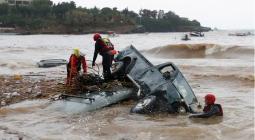Heavy flooding is UK’s climate crisis ‘wake-up call’, says Tewkesbury Abbey canon
‘We need to move so much faster’ to battle climate crisis, warns the Rev Canon Nick Davies, as locals assess damage
Standing at the top of Tewkesbury Abbey tower, the Rev Canon Nick Davies is talking about the flood.
But this is no sermon; the vicar is not reading from the Book of Genesis. He is discussing the flood waters before his very eyes, stretching far into the distance and besieging the medieval market town once again.
And while Davies is more accustomed to spreading the word of God, on Friday he wanted to convey another message: he wanted to talk about the climate emergency.
“Tewksbury has been flooded since Roman times,” he says, looking over the deluge that has swamped dozens of homes as well as the cricket ground, recreation ground and car park.
“But what we’re seeing now with climate change is that those extreme weather events are becoming more frequent. Global warming enables clouds to hold more moisture and drop it more swiftly on places like here or elsewhere. And that’s what we’re seeing.
“And for me, this isn’t just about floods in Tewkesbury. It’s a wake-up call for the nation. We cannot be surprised every time there is a storm that does this.
“It’s about our carbon footprint. It’s about land usage. It’s about not building on floodplains. It’s about joined-up thinking across the Severn river basin. And that’s what we need if we’re not going to be back here in another few years’ time.”
Tewkesbury is synonymous with flooding, reinforced by the striking image of its famous Norman abbey towering above the overflowing Severn and Avon rivers. In 2007, the town of 15,000 was one of the worst-hit in some of the most severe flooding experienced in the UK in decades.
While there is a sense of deja vu and even acceptance among some of Tewkesbury’s residents, this is not the case for Davies, who took up his post in September and is animated about tackling the climate crisis.
“Tewkesbury is a little bit fed up with being the poster child for flooding,” he says. “Our floodplains, year in year out, do what they’re there to do … But what we actually need to do is get into the detail of climate change and how that’s affecting our planet and our weather patterns and do something about it.”
Davies talks about possible responses to the crisis, questioning people’s need to fly, and discussing the decarbonising of transport.
He said: “How are we personally making our lifestyles create a smaller carbon footprint? But also, [how are we] pushing on that legislation, pushing on those national conversations, those international agreements?
“Because we need to move so much faster than we’re doing. We need to stop being surprised, we need to wake up and smell the coffee and what’s going on with our climate. And if the fact that these photos are going around the world again gives us an opportunity to do that, and a voice to have that conversation, that’s great.”
Not far from the abbey, a row of heritage terraces on Gloucester Road have been breached overnight, their ground floors under at least two feet of water.
Sarah Rosser, 49, has lived in one of the properties for three years with her husband and two teenagers, and this is the first flood she has experienced as a resident. Her in-laws have lived in the house four doors down for 44 years, so she was aware of the risk.
“We knew what the deal was,” she says. “We have a beautiful house and, to put it in the bluntest terms, if there wasn’t a flood risk, we wouldn’t be able to afford the house. The benefits outweigh the risks for me. But it is heartbreaking, devastating, overwhelming.”
Rosser, her husband, her in-laws and one of her sons spent the night in the Bell hotel, just 100m away on Gloucester Road, after evacuating their home on Thursday afternoon.
“I haven’t slept very well for the last two nights,” she says. “And what I’m more dreading is how long this is going to take. We’ve got six months of downstairs being an absolute disaster.”
Matthew Bloodworth, 41, who lives a few doors down, bought his home with his wife, Caroline Price, three years ago, and is also experiencing flooding for the first time.
After spending the night in a room above the town’s Wetherspoon’s pub, he returned to find the ground floor of their home ruined. “The laminate flooring has come up, all white goods are gone, all the paint has peeled. Luckily, we saved the piano.”
Bloodworth was aware of the flooding risk when they bought, but was not expecting this level of devastation. “They said when we bought the property, ‘it comes in the garden like once a year, maybe twice a year’. But I’ve been there two and a half years and it has never come in the garden.”
He says he tries to look on the bright side. On Friday morning, he decided to buy his first pair of wellies and went to Mountain Warehouse on Tewkesbury High Street, where they had one pair left in a size 12. “And I’m a size 12,” he says, beaming.
Cover photo: Tewkesbury is ‘fed up with being the poster child for flooding’. Photograph: Adrian Sherratt/The Guardian




